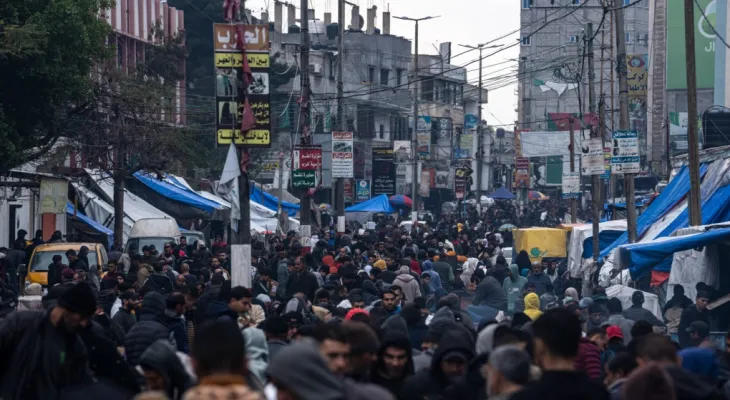Search here
Newspaper
Search here

Arab Canada News
News

Published: February 19, 2024
The Ministry of Health in the besieged Gaza Strip said today, Monday, that more than 29,000 Palestinians have been killed in Gaza since the start of the war between Israel and Hamas, marking another grim milestone in the deadliest round of violence in the history of the Israeli-Palestinian conflict.
Israeli Prime Minister Benjamin Netanyahu pledged to continue the offensive until achieving "complete victory" over Hamas, raising fears that forces will soon move into the town of Rafah at the southernmost tip of the strip on the Egyptian border, where more than half of Gaza's 2.3 million residents have sought refuge from fighting elsewhere.
The United States, Israel's biggest ally, says it is still working with mediators from Egypt and Qatar to try to broker another ceasefire deal and the release of hostages. But these efforts appear to have stalled in recent days, and Netanyahu angered Qatar, which has hosted Hamas leaders, by calling on it to pressure the group.
The Ministry of Health said that 107 bodies were brought to hospitals in the past 24 hours. This brings the total number of dead to 29,092 since the start of the war.
The ministry does not distinguish between civilians and fighters in its records, but says about two-thirds of the dead were women and children. More than 69,000 Palestinians have been injured, overwhelming hospitals in the strip, less than half of which are partially operating.
The Ministry of Health is part of the government run by Hamas in Gaza but keeps detailed records of casualties. Its figures from previous wars in Gaza largely matched those of United Nations agencies, independent experts, and even Israeli figures.
The war began when militants led by Hamas stormed southern Israel from Gaza on October 7, killing about 1,200 people, most of them civilians, and taking about 250 hostages.
More than 100 prisoners were released during a week-long ceasefire in November in exchange for the release of 240 Palestinians held by Israel; Hamas still holds about 130 people, of whom a quarter are believed to be dead.
Israel responded to the attack with one of the deadliest and most destructive military campaigns in recent history against the besieged strip, which has been governed by Hamas since 2007.
Israel announced it had killed more than 10,000 Palestinian militants without providing evidence, while the army says it tries to avoid harming civilians and blames Hamas for the rising death toll because the armed group fights in densely populated residential neighborhoods, confirming that 236 of its soldiers have been killed since the start of the ground offensive in late October.
The war, which shows no sign of ending, has displaced about 80% of Palestinians in Gaza from their homes and left a quarter of the population starving, according to UN officials.
On Sunday, Benny Gantz, a retired general and member of Netanyahu's three-member war government, warned that the offensive will expand to Rafah if hostages are not released by the start of the holy month of Ramadan, expected to begin around March 10. The fasting month, from dawn to dusk, is often a time of heightened tensions in the region.
Israel said it is working on plans to evacuate civilians from Rafah, but it is unclear where they would go in the devastated area, large parts of which have been leveled. Egypt has closed its border and warned that any mass influx of Palestinians could threaten the peace treaty it made with Israel decades ago.
The United States says it is still pushing for a truce and the release of hostages, and that it will veto a United Nations Security Council resolution calling for an immediate ceasefire because it conflicts with those efforts.
Hamas said it will not release all remaining hostages until Israel ends the war and withdraws from Gaza. It also demands the release of hundreds of Palestinian prisoners, including senior activists.
Netanyahu rejected those demands, describing them as "delusions." In a speech to American Jewish leaders on Sunday, he said pressure must be applied to Qatar, which played a key role in mediating last year's ceasefire and hostage release agreement.
Netanyahu said, "Qatar can pressure Hamas like no one else can. They host Hamas leaders, and Hamas depends on them financially." "I urge you to pressure Qatar to pressure Hamas because we want the hostages held by Hamas to be released."
Qatari Foreign Ministry spokesman Majid al-Ansari rejected Netanyahu's statements, describing them as "a new attempt to obstruct the war and prolong it for reasons that have become clear to everyone," referring to Netanyahu's internal political problems.
Qatar denies funding Hamas and says its aid to Gaza in recent years has been implemented in full coordination with Israel, the United States, and other parties.
Al-Ansari said, "The Israeli Prime Minister knows well that Qatar has been committed from day one to mediation efforts, ending the crisis, and releasing the hostages."
Comments